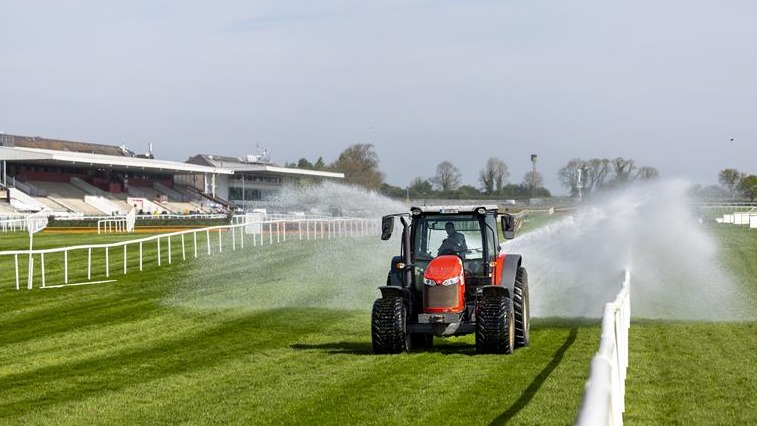
Watering Racecourses
Watering Racecourses
-
Racecourse Target Going (NH) Target Going (Flat) Ballinrobe Good Good Bellewstown Good Good, Good to Firm in places Clonmel Good Good Cork Good Good to Firm Curragh n/a Good to Firm Down Royal Good Good to Firm Downpatrick Good n/a Dundalk n/a n/a Fairyhouse
(Grand National Festival)Good
Good to YieldingGood to Firm Galway Good Good Gowran Park Good Good to Firm Kilbeggan Good n/a Killarney Good Good, Good to Firm in places Laytown n/a n/a Leopardstown Good to Yielding Good to Firm Limerick Good Good to Firm Listowel Good Good Naas Good Good to Firm Navan Good Good to Firm Punchestown
(NH Festival)Good
Good to Yieldingn/a Roscommon Good Good to Firm Sligo Slow Side of Good Slow side of Good Thurles n/a n/a Tipperary Good Good to Firm Tramore Good Good Wexford Good n/a
Procedures for Watering Racecourses
- The racecourse manager or authorised deputy (hereafter referred to as ‘the racecourse’) must liaise with the Clerk of the Course before watering commences, and a program agreed upon to achieve going reflective of the ‘Target Going’ on the raceday. It is the racecourses’ responsibility to carry out this watering program as advised by the Clerk of the Course.
- The watering program agreed may commence as soon as the Clerk of the Course deems necessary and the racecourse must maintain a record of the watering applied on a daily basis. Information on a racecourse’s watering program for a particular meeting will be communicated by the IHRB, once agreed upon by the Clerk of the Course.
- If the racecourse thinks it necessary to deviate from an agreed program, they must firstly consult with, and get agreement from, the Clerk of the Course. The watering program may need to be changed or halted to reflect, for example, a change of weather forecast. All such decisions should be reached between the racecourse and the Clerk of the Course, uninfluenced by any other stakeholders. Any updated information on a watering program will be communicated by IHRB thereafter.
- Ideally, if conditions allow, watering should not continue beyond 8 hours before the start of the meeting. However, particularly for evening meetings held on warm summer days, watering may continue at the discretion of the Clerk of the Course until such time as he deems appropriate.
- Watering should not first commence within 24 hours of the starting time of the first race (with the exception of multi-day meetings), unless in limited, exceptional circumstances, where the Clerk of the Course is satisfied that to begin watering at this point in time is absolutely necessary and the surface has been spiked and/or aerated.
- The Directors of IHRB emphasise the importance of spiking and/or aerating all race tracks at appropriate times during the year, whether water is being applied or not.
- Watering should only be done by bulk tankers if no other system is available. If bulk tankers are used, careful supervision is necessary by the racecourse to avoid false patches of ground, and tankers should be fitted with a boom if possible to prevent soil compaction.
- When watering takes place, and where possible, the racing area should be limited to that watered ground prepared for the race day, by the use of rails or dolls.